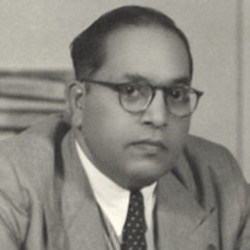Difference between revisions of "Bhimrao Ambedkar"
(Created page with "thumb|250px| Bhimrao Ambedkar was born in India into the untouchable caste in 1891. After managing to get a basic education, he won scholarships to st...") |
|||
| Line 1: | Line 1: | ||
[[File:Ambedkar.JPG|thumb|250px|]] | [[File:Ambedkar.JPG|thumb|250px|]] | ||
| − | Bhimrao Ambedkar was born in India into the untouchable caste in 1891. After managing to get a basic education, he won scholarships to study in England and the USA and became a brilliant lawyer. In the following years, he became a vigorous and outspoken social reformer, in particular criticising the Hindu caste system. After Indian independence, Ambedkar chaired the committee that wrote the country’s new constitution. After years of unsuccessful campaigning to get acceptance and equality within Hinduism, Ambedkar finally decided to become a Buddhist. In 1956, he and hundreds of thousands of his followers took the Three Refuges. Tragically, he died a few months later but the movement he started did not die with him and today there are about eight million Buddhists in India. The resurgence of Buddhism in modern India should be credited to Bhimrao Ambedkar. | + | [[Bhimrao Ambedkar]] was born in [[India]] into the untouchable [[caste]] in 1891. After managing to get a basic [[education]], he won scholarships to study in England and the {{Wiki|USA}} and became a brilliant lawyer. In the following years, he became a vigorous and outspoken {{Wiki|social}} reformer, in particular criticising the [[Hindu]] {{Wiki|caste system}}. After [[Indian]] {{Wiki|independence}}, Ambedkar chaired the committee that wrote the country’s new constitution. After years of unsuccessful campaigning to get acceptance and [[equality]] within [[Hinduism]], Ambedkar finally decided to become a [[Buddhist]]. In 1956, he and hundreds of thousands of his followers took the [[Three Refuges]]. Tragically, he [[died]] a few months later but the {{Wiki|movement}} he started did not [[die]] with him and today there are about eight million [[Buddhists]] in [[India]]. The resurgence of [[Buddhism]] in {{Wiki|modern}} [[India]] should be credited to [[Bhimrao Ambedkar]]. |
| − | Ambedkar and Buddhism, Sangharakshita, 1986. | + | Ambedkar and [[Buddhism]], Sangharakshita, 1986. |
{{R}} | {{R}} | ||
[http://www.buddhisma2z.com/content.php?id=14 www.buddhisma2z.com] | [http://www.buddhisma2z.com/content.php?id=14 www.buddhisma2z.com] | ||
[[Category:India]] | [[Category:India]] | ||
[[Category:Buddhist Terms]] | [[Category:Buddhist Terms]] | ||
Latest revision as of 20:47, 19 September 2013
Bhimrao Ambedkar was born in India into the untouchable caste in 1891. After managing to get a basic education, he won scholarships to study in England and the USA and became a brilliant lawyer. In the following years, he became a vigorous and outspoken social reformer, in particular criticising the Hindu caste system. After Indian independence, Ambedkar chaired the committee that wrote the country’s new constitution. After years of unsuccessful campaigning to get acceptance and equality within Hinduism, Ambedkar finally decided to become a Buddhist. In 1956, he and hundreds of thousands of his followers took the Three Refuges. Tragically, he died a few months later but the movement he started did not die with him and today there are about eight million Buddhists in India. The resurgence of Buddhism in modern India should be credited to Bhimrao Ambedkar.
Ambedkar and Buddhism, Sangharakshita, 1986.
